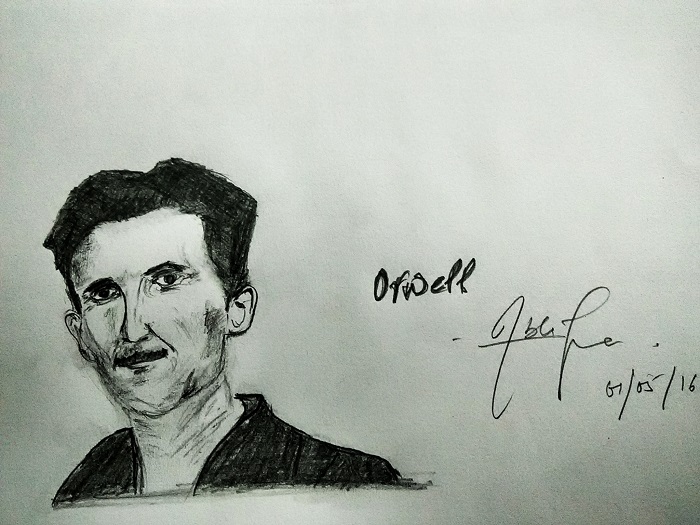To judge somebody you haven’t ever met can be a daunting task. To judge somebody on the basis of what the person has done or written can be a miscarriage of fairness. Political heroes or villains are primarily judged in time by their actions in public view and their writings if available. This is to say for commentators who haven’t met the person. How your actions are judged depends largely on the media of the time as well.
If I may, I would point you to the essay – ‘Reflections of Gandhi‘ by George Orwell. Why? Because his observations are as objective as they can get. In my opinion the essay stands out for a couple of things –
1. As the title suggests, the essay is indeed a reflection on Gandhi. The observations are so fluidly presented that it often feels like Orwell is talking to himself oblivious of our presence around him. He is not a great fan of Gandhi, neither is he a hater who can’t see beyond the aesthetics of the man. This puts him in a unique position.
2. Through his other essays, his hatred for any kind of imperialism is quite evident. However, since he knew the British ways too, he could look at Gandhi from the other side of the fence and was still in harmony with the dreams of free India that Gandhi nurtured.
George Orwell wrote his essay on Gandhi in 1949, a year after he was dead. He derives most of his ideas about the man – Gandhi from his autobiographical work My Experiments With Truthand other articles Mr Gandhi wrote for the press of the time. Mr. Orwell himself having lived a few years in the colonial Indian subcontinent, had a fair awareness of the situation back here. In addition, he was a prominent political observer and commentator of the time and hence must have judged Mr. Gandhi via his actions, interviews, and media interactions. What Mr. Orwell has written about Gandhi is of paramount importance and has been rightly placed at No 2 in the list of Greatest essays of Orwell as judged by Pulitzer prize winning writer Michael Hiltzik. The commentaries in our own country over Gandhi have been largely either biased highly in favor of the man or extremely against him. The Marxists and the so called Ambedkarites can’t contain their hatred for the man. The Indian National Congress though has nothing in common with the original Gandhi, is religiously exploiting the last name that they actually got from Mr. Feroze Ghandy (Do not get surprised here, many actually believe Mahatma Gandhi and present Gandhi scion are related.). If Mahatma Gandhi had the copyright to the surname Gandhi and had actually disallowed the usage of it, Mr. Rahul Gandhi would have been called Rahul Ghandy today and Mahatma Gandhi could have been spared some unfair posthumous embarrassment. The BJP has been trying to appropriate Mr. Gandhi in its own way and have been quite successful in leaving congress with nothing but shrill calls of ‘He-Is-Not-Yours’ and ‘You-Are-The-killers-Of-Gandhi’! This was not entirely unexpected given the predilection of the Congress party over the surname rather than the Gandhian way of life and politics. When you don’t feed your dog well, some day your neighbor will!
One important question that I have asked myself is whether the essay is prejudiced. Largely no, but there are enough signs of prejudices to be detected by any reader who has followed Orwell and his life for some time. Orwell’s own lifestyle has an effect on the essay and at times he digresses for the sake of satirical declarations that are hallmarks of his writings. However, such utterances are rare and the piece remains rational for the most part.
Orwell goes on to ponder upon the extent to which Gandhi was responsible for India’s freedom and counts many reasons that could have been responsible. He doesn’t give a judgement and says – “But if, by 1945, there had grown up in Britain a large body of opinion sympathetic to Indian independence, how far was this due to Gandhi’s personal influence? And if, as may happen, India and Britain finally settle down into a decent and friendly relationship, will this be partly because Gandhi, by keeping up his struggle obstinately and without hatred, disinfected the political air? That one even thinks of asking such questions indicates his stature.”
Orwell would have celebrated his 113th year on 25th June had he been alive. His bio headline is perhaps a signature to the eccentricity of his life – Born in Motihari, Bihar and Died in London, United Kingdom. Mr. Orwell has been one of my favorite writers for some time now and Mahatma Gandhi will remain a Hero I shall admire all my life. Though they might stand diametrically opposite to each other on the clocks of life and lifestyle, both of them had their own fallacies. However what they achieved in one lifetime makes the fault-lines almost invisible. My only regret is that while I can read and decide what Orwell thought of Gandhi, I have no way of knowing what Gandhi thought of him. I wonder what took Mr. Orwell so long to write about Gandhi. Sometimes it needs a death to trigger those thoughts that we keep pushing to the next day. Sadly, Orwell didn’t live much longer either. He passed away in 1950. I would have wished him a few more happy years for his life on his birthday.

